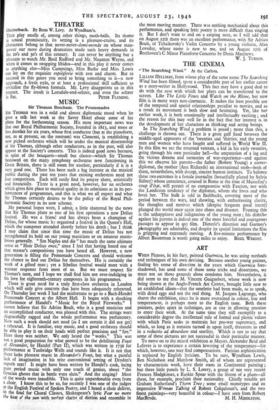THE CINEMA
" The Searching Wind." At the Carlton.
LILLIAN HELLMAN, from whose play of the same name The Searching Wind has been filmed, spent a considerable part of her earlier career as a story-writer in Hollywood. This fact may have a good deal to do with the ease with which her plays can be transferred to the screen. Like The Little Foxes and Watch on the Rhine, her new film is in many ways non-cinematic. It makes the least possible use of the temporal and spatial relationships peculiar to movies, and as a result its movement is both slow and hesitating. Yet, like her earlier work, it is both emotionally and intellectually exciting ; and the reason for this may well lie in the fact that her interest is in the development of her characters as thinking and acting beings.
In The Searching Wind a problem is posed ; more than this, a challenge is thrown out. There is a great gulf fixed between the middle-aged appeasers of the 'twenties and 'thirties, and the young men and women who have fought and suffered in World War II. In this film we see the returned veteran, a kid in his early twenties, going through his own particular hell—the amputation of a leg and the vicious dreams and memories of war-experience—and against this we observe his parents—the father (Robert Young) a career- diplomat, the mother (Ann Richards) an international snob—both of them, nevertheless, with decent, sincere human instincts. To balance these two extremes is a female journalist (beautifully played by Sylvia Sidney) whose conscience, aroused in Rome at the time of Mussolini's coup d'etat, will permit of no compromise with Fascism, nor with the Laodicean tendency of the diplomat, whom she loves and who love's her. The bulk is told in flashbacks, covering most of the period between the wars, and showing, with embarrassing clarity, the thoughts and motives which (despite frequent good intent) plunged the world once again into chaos and disaster. Framing this is the unhappiness and indignation of the young man ; his diatribe against his parents is indeed one of the most forceful and courageous passages to appear in any film. Dieterle's direction and Garmes's pkotography are admirable, and despite its spatial limitations the film is gripping and extremely moving. A five-minute performance by Albert Basserman is worth going miles to enjoy. BASIL WRIGHT.


























 Previous page
Previous page